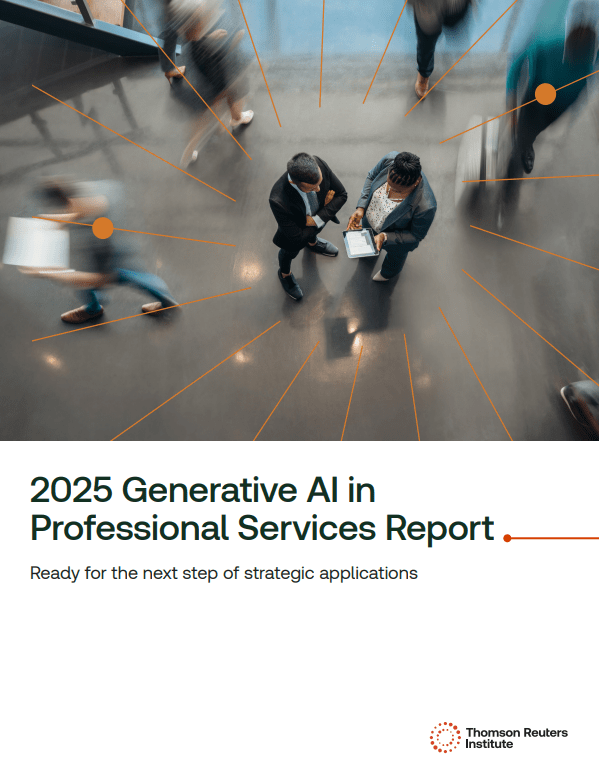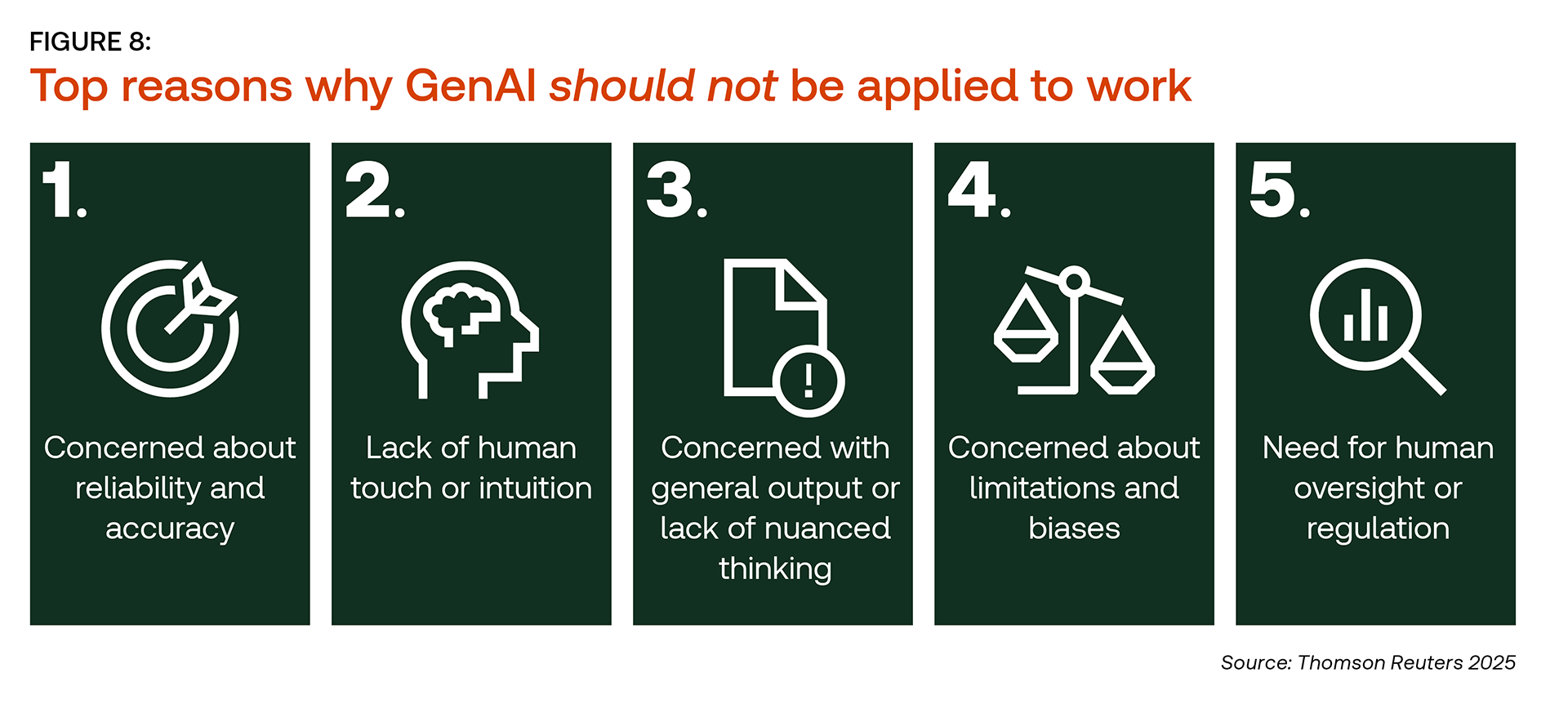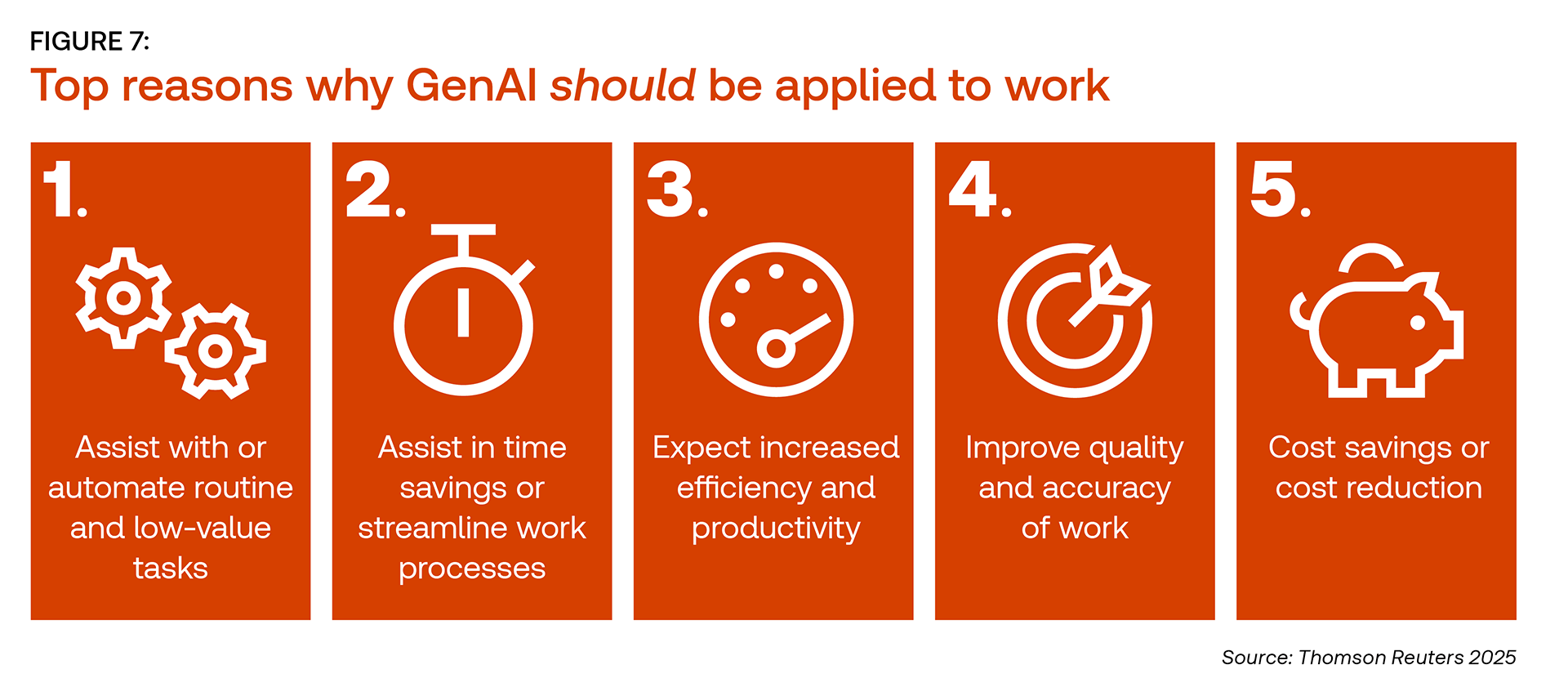Understand how to navigate generative AI concerns, why legal-specific AI tools are still important, and how to prepare for an AI-driven future
Seeking evidence that generative artificial intelligence (GenAI) adoption within professions is increasing? The Thomson Reuters Institute’s recently released 2025 Generative AI in Professional Services Report, which surveyed more than 1,700 respondents across the United States, the United Kingdom, and Canada. Among those who responded, 95% believe it will be central to their organization’s workflow within the next five years.
That said, many legal professionals still have serious concerns about generative AI. But there are ways to help them navigate through these waters—in particular, professional-grade GenAI specifically designed for legal work is how concerns can be alleviated, because the tool knows the complexities of legal work.
Jump to ↓
Top 5 concerns surrounding generative AI
Why you still need generative AI for legal

2025 Generative AI in Professional Services Report
Explore all the latest comprehensive insights into how GenAI is shaping professional services.
Access full report ↗
Top 5 concerns surrounding generative AI
Some professionals are unaware of the advancements that have been made in GenAI technology, leading to reasonable concerns and legal issues. It’s safe to say that certain perceived risks exist because many professionals haven’t tried the technology yet, or they are overwhelmed by the numerous options available and are unsure which ones are secure enough for their work.
While it’s natural to be cautious about adopting new technology, completely discounting generative AI can pose a disadvantage. Professional-grade GenAI tools are specifically designed to address the concerns of legal professionals, offering reliable, accurate, and secure solutions. Embracing GenAI allows legal professionals to strengthen relationships with prospective clients and stay ahead in a rapidly evolving industry.
Based on survey responses, the Thomson Reuters Institute identified the top five concerns that professionals have about generative AI. Here are those concerns and how to alleviate them while using GenAI to focus on the benefits for your legal work.
Reliability and accuracy
This is the primary concern that the report’s respondents expressed. Legal reputations are built largely upon the accuracy of detail. GenAI, by its nature, cannot be 100% accurate in all scenarios. Many respondents will accept nothing less. Even those willing to accept a lower level of accuracy don’t think that GenAI can achieve even that, at least not yet.
This is why legal practitioners need a GenAI system designed specifically for their profession. Such a tool should access the most reliable and up-to-date legal information, thus delivering trustworthy results.
Professional-grade GenAI tools are designed to access the most reliable and up-to-date legal information, ensuring trustworthy results. By using these tools, legal professionals can mitigate the risks associated with inaccuracies and enhance the efficiency and accuracy of their tasks.
How it can reduce concerns
Lack of human touch
Another issue that legal professionals have is around AI development. Some AI tools are not developed with legal professionals in mind, but for everyday consumers, and that can pose a legal risk.
Legal professionals need to seek out generative AI tools that are specifically designed with their unique needs in mind, ensuring that these tools provide the essential human touch. Such tools should be intuitive and user-friendly, allowing legal practitioners to leverage their capabilities without requiring extensive IT expertise. Moreover, these AI solutions must be capable of capturing the nuanced human elements that are crucial in legal contexts, such as the subtleties of language and the intricacies of legal arguments.
By incorporating domain experts in the development process, these tools can better understand and address the complexities of legal work, ultimately delivering reliable and high-quality results. This approach not only enhances the efficiency and accuracy of legal tasks but also ensures that the technology complements rather than replaces the invaluable human judgment and expertise that legal professionals bring to their work.
Generative AI tools tailored for legal professionals incorporate domain experts in their development process, capturing the nuanced human elements crucial in legal contexts. These tools complement the invaluable human judgment and expertise, allowing legal practitioners to focus on what they do best.
How it can reduce concerns
Quality of output
This concern is, of course, related to the reliability issue. How detailed and up-to-date is the information that a GenAI tool provides? What legal sources does it draw from? How far can it be trusted?
Legal professionals often express concerns about the quality of output from generative AI tools, fearing that inaccuracies could compromise their work. However, these worries can be alleviated by recognizing that many of today’s AI tools are highly reliable and produce quality outputs, thanks to their use of proprietary data.
By focusing on tools that adhere to high data quality standards and are built on proprietary datasets, legal professionals can ensure that the information they receive is both accurate and trustworthy. This approach not only mitigates the risks associated with AI-generated content but also enhances the overall efficiency and effectiveness of legal tasks.
Today’s professional-grade GenAI tools adhere to high data quality standards and are built on proprietary datasets, ensuring accurate and trustworthy information. By focusing on these tools, legal professionals can mitigate concerns about AI-generated content and improve the overall efficiency of their work.
How it can reduce concerns
Need for human oversight or regulation
As should be clear, the reservations professionals have about GenAI are interconnected. One of those worries is that there are few regulatory rules about AI technology’s ethical use. How can they be sure that other legal practices aren’t taking advantage of GenAI’s biases and the information it might generate? How about data protection like intellectual property? And what about security and data privacy issues to prevent data breaches?
Clearly, the legal professionals using GenAI need to provide that oversight themselves. It’s worth remembering that ChatGPT was publicly released fairly recently (November 2022). Regulations and best practices around legal issues are still under development. Legal professionals will want to research how other practices and industries are handling ethical concerns to help craft in-house rules regarding responsible use.
Professional-grade GenAI tools are developed with ethical considerations in mind, providing reliable and secure solutions for legal professionals. By adopting these tools, practitioners can ensure responsible use and stay ahead of the curve as regulations and best practices evolve.
How it can reduce concerns
Limitations and biases
GenAI systems, if not carefully designed, can incorporate and amplify the biases from the training data and the datasets they draw from. This renders outputs less than thorough and authoritative. What’s more, badly trained GenAI platforms may generate hallucinations—clearly incorrect or nonsensical “information.”
Again, GenAI requires hands-on review, as well as training in how to word prompts to boost output quality. Legal professionals can mitigate concerns about bias in several other ways—for instance, by confirming the sources that the GenAI system draws from to ensure proper attribution.
Professionals are also discovering that generative AI excels at handling routine tasks, rather than the specialized work they are most skilled at. By utilizing machine learning, algorithms, natural language processing, and large language models (LLMs), significant advancements can be achieved—from AI models to productivity enhancements.
However, complex reasoning, deep understanding of clients or subject matter, and the ability to empathize or show compassion are irreplaceable by AI-driven technology, which is designed to manage non-complex, repetitive, and fact-based tasks. In essence, professionals should view generative AI as a tool that complements their expertise, allowing them more time to focus on what they do best.
Professional-grade GenAI systems are carefully designed to minimize biases and ensure thorough, authoritative outputs. By using these tools, legal professionals can mitigate concerns about bias and enhance the quality of their work.
How it can reduce concerns
Why you still need generative AI for legal
The 2025 Generative AI in Professional Services Report also makes clear that, despite these concerns, professionals are steadily growing more comfortable with GenAI. They’re also experiencing AI benefits. The report lists reasons why the professionals it surveyed believe that GenAI should be applied to their work. In addition, the report reveals that an increasing number of legal practitioners are incorporating GenAI into their workflows. Among the report’s law firm respondents, the percentage of positive responses increased from 51% in 2024 to 59% in 2025.
Benefits of generative AI
There are several reasons why legal professionals are increasingly excited about GenAI’s current use as well as its future prospects. A GenAI tool designed for legal work helps legal professionals save time and boost productivity. It can gather and analyze vast amounts of complex legal data (such as precedents and case law) in seconds rather than hours.
As a result, generative AI can conduct more accurate and efficient research than human beings can undertake manually. GenAI also can uncover resources that lawyers and staffers might not have known existed, thus helping them make more informed decisions.
Use cases for legal professionals
By automating repetitive tasks such as reviewing and summarizing documents, gathering and analyzing research data, and collating presentations, GenAI allows legal professionals to focus on improved decision-making and more productive, engaging work—work that provides greater value to legal professionals and to their clients or organizations.
For instance, generative AI helps law firms address major client pressures: the need for reduced expenses and rapid answers to legal queries. With GenAI, professionals can automate their legal work. By empowering lawyers to deliver these benefits, GenAI not only gives clients a competitive advantage but also strengthens the competitive position of the legal practice itself.
Preparing for the future
While it’s natural to be cautious about adopting new technology, the real concern and risk is completely discounting generative AI. Professional-grade GenAI tools are specifically designed to address the concerns of legal professionals, offering reliable, accurate, and secure solutions
By not utilizing these advanced tools, legal practitioners may find themselves lagging behind competitors who leverage AI to deliver faster answers and more efficient services. Embracing GenAI allows legal professionals to strengthen relationships with prospective clients and stay ahead in a rapidly evolving industry. The true risk lies in not adopting these tools and missing out on the competitive advantages they offer.
As they anticipate the future of their work, more and more legal professionals will be conducting rigorous due diligence on AI-powered solutions. They’ll be seeking a solution that provides benefits while reducing the concerns.
There are a couple of qualities to look for when researching a professional-grade GenAI solution. You need one that understands professional standards and can deliver reliable results at superhuman speed. Most importantly, it needs to be encrypted end-to-end, so your data—and your customers’—remains private and secure. That is professional-grade GenAI.
By grounding AI responses in this authority, professional-grade GenAI tools help ensure that technology enhances rather than undermines the quality of legal services. CoCounsel is the industry-leading GenAI assistant that works alongside you within all your legal products and integrations. CoCounsel goes with you from task to task, from research to analysis to drafting—creating a single, seamless workstream. CoCounsel is the legal assistant you can trust.
- Quality data. Unparalleled access to the highest quality legal content with over 100 years of editorial enhancements.
- Legal expertise. Only Thomson Reuters has such breadth and depth of trusted legal content, enhanced by 1,200+ expert, bar-admitted full-time attorneys.
- GenAI expertise. Over 1,000 GenAI, machine learning, and data professionals are building best-in-class tools for lawyers.
- History of innovation. The first online legal service. The first natural language search in any industry. Decades of experience delivering what lawyers need.
- One unified experience. The legal assistant that connects all the places you work, from Westlaw to Word.
- Industry-leading. Highly ranked in the first Vals.ai benchmark survey of legal AI. The first legal AI assistant in the market continues to lead with fast-paced improvements.
Bringing together generative AI, trusted content and expert insights
CoCounsel












